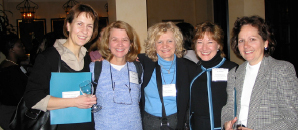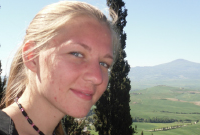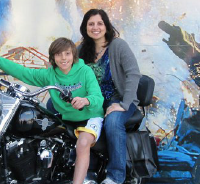Interview with Carla Romero
For many members of the CRA-W community, Carla Romero has been their connection with CRA-W. Carla is leaving CRA-W for new challenges, so we take this opportunity to interview her as a way to say “goodbye and thank you.”

As Director of Programs at the Computing Research Association (the parent organization of CRA-W), Carla has been involved with the broad range of programs focusing on human resources, on community-building, and on connecting CRA with the other organizations advancing science and engineering. In particular, she supports CRA’s Committee on the Status of Women in Computing Research (CRA-W). She also supports several other CRA committees such as the Coalition to Diversity Computing (CDC), the CRA Deans Group, and others.
Before coming to CRA, Carla designed and implemented educational programs at universities in Texas and New Mexico to encourage and support the participation of students from underrepresented groups in STEM disciplines. The programs she developed included: family math academy; peer mentoring/tutoring initiatives; bridge programs from high school through graduate school; research experience for undergraduates; and, a peer educator network. In addition, Carla has been active in providing training and resources to enhance the professional development and leadership skills of underrepresented students on and off campus.
Carla has served on several committees and boards including the Expanding Your Horizons Planning Committee, the American Indian Science and Technology Education Consortium, the Hispanic Women’s Network, The Serie Project, and Hispanic Heritage Awards. In addition, she has been involved as an advisor or member of NAMEPA, SHPE, MAES, NSBE, SACNAS, the GEM Consortium and Latinas in Computing. She is the recipient of service awards including the 1993 NASA Training Project Hero Award for her support of underrepresented group students in STEM.
A native of New Mexico and first-generation college graduate, Carla received her B.A. in English, pre-law at the University of New Mexico, and her M.P.A. at the University of Texas, El Paso. She uses some of her free time assisting grass roots non-profit organizations and Latino/a artists in the areas of marketing, public relations, and fundraising.
Q: Many readers know you as their interface to CRA-W programs they’ve participated in, however, few people know the scope of everything you do for CRA-W. What has your role been?
I am Director of Programs at CRA and in that role the majority of my time is spent supporting the CRA-W. In this role, I work with the committees of dedicated volunteers to implement new and existing programs. I also plan and coordinate CRA-W activities – mainly taking care of the logistics for workshops and meetings. In addition, I help the committee members secure funding for operations and programs and oversee the expenditures from the grants and other funds the committee receives. I am also responsible for writing various reports, creating promotional materials and content for the CRA-W and its activities, and facilitating communication internally and externally.
Q: What else do you do for CRA and other efforts for increasing diversity in computing.
I also support the Coalition to Diversify Computing (CDC) – a joint committee of the CRA, ACM and IEEE-CS. Their mission is to develop and foster a diverse community of computing professionals through programs that recruit and retain minority undergraduate and graduate students that can transition into academia or industry. Another group I support is the CRA Deans committee – which meets twice a year to discuss issues specific to deans of Computing and Information Technology schools.
Q: What career path brought you to CRA-W in the first place?
I had intended to go to law school so I was in a pre-law program at University of New Mexico (UNM). However, I took a part-time job at UNM as a program coordinator for the NASA Training Project. That summer was a turning point for me. I was hooked on student development and decided to change my career path. Instead of law school, I pursued a Masters in Public Administration and have worked mainly at universities over the course of my career developing programs for STEM students.
Q: What have you enjoyed most about your career?
I have been fortunate to meet and work with many fascinating people – students, faculty, staff, and industry members. However, working with students and seeing them progress in their academic and professional careers has been truly rewarding. I still keep in touch with many of the students who have been through the various programs I was a part of.
Q: What challenges have you had to face?
Overall, my life has been a wonderful and interesting journey. We all have obstacles or unpleasant occurrences, but they are really just experiences from which we can learn.
Q: You have a unique perspective on CRA-W since you have been a constant presence as co-chairs have come and gone. What changes have you seen in CRA-W during your tenure? What challenges and opportunities do you see in CRA-W’s future?
The main change I have seen in CRA-W is the growth of its programs and activities. In some programs the number of participants has increased and the committee members have developed several new programs. For example, since I started in 2003, Grad Cohort, Cohort for Advanced Professional Project (CAPP), and the Discipline-Specific Workshops (DSW) have been implemented. Also, a newsletter, a new website, and formal collaborations with other organizations have been put into place. Through the Broadening Participation program, CRA-W formed an alliance with the CDC. This alliance has broadened the pool of organizers and participants as well as strengthened the programs. The CRA-W is also partnering with other organizations to provide Career Mentoring tracks. This shift has, definitely, been positive in that more people have access to this valuable information and expertise.
Finding enough funding to support all the activities and potential participants is always a challenge. However, by partnering with other groups and leveraging resources, CRA-W and other organizations with similar missions can make the most of the limited funds. One of the major strengths of CRA-W is that many of the first participants are now in a position to serve as mentors and role models or be a strong advocate for CRA-W. This rich pool of women have been an amazing resource in that they want to give back to the organization and help the next generation of computing researchers.
Q: How do you deal with work/life balance?
I like to work hard and play hard. I really enjoy spending time with my incredible family and friends. My passion is travel and I try to take at least one big trip a year and a trip to the beach. I like to create art and jewelry when I have time as well as visit museums and galleries.
Q: What are your plans after leaving CRA-W?
I plan to move back to my hometown – Al-buquerque, NM – and spend some time with my family and friends. I intend to slow down my pace a bit and enjoy the art and culture of the southwest. It’s likely I will continue working in the area of student development for STEM programs.
Q: Do you have any parting advice for the CRA-W community?
I feel very fortunate that I was a part of the CRA-W community. One of the great things about CRA-W is that it has evolved and continues to respond to needs within the community. I think by just continuing to being open to new opportunities and continuing to keep the mission of the organization at the forefront will lead to continued success.






